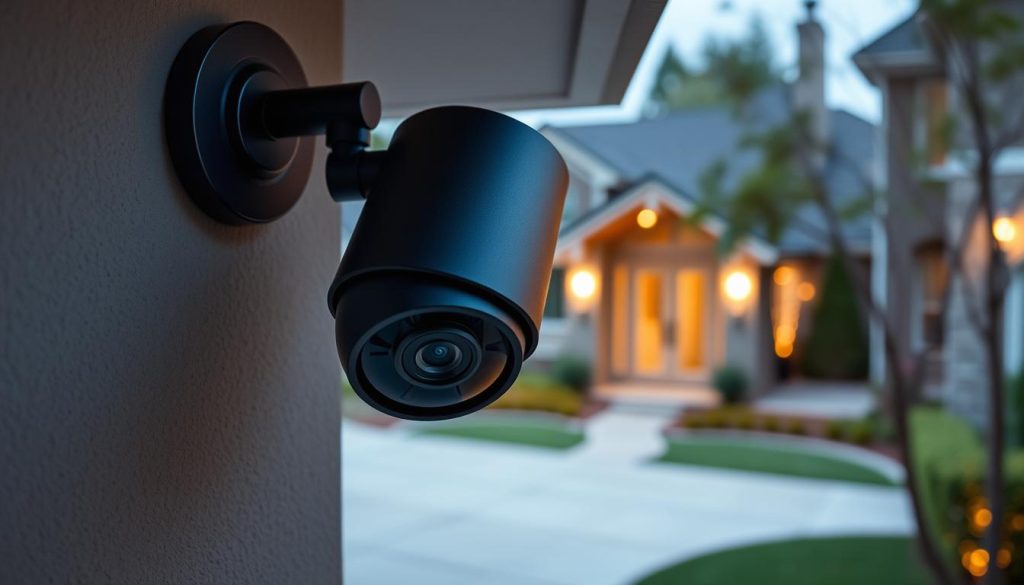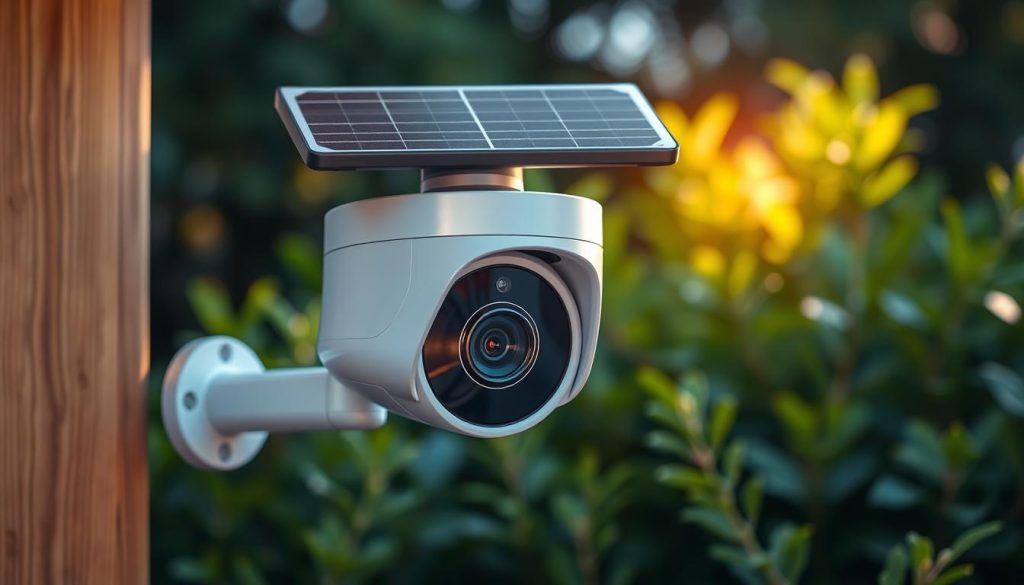In Singapore, 70% of residents express concerns about protecting their homes. With year-round sunshine, a solar-powered security setup is an ideal solution. These devices stay operational even during cloudy days, with top models offering up to 12 months of battery life.
The local market offers options ranging from SGD 200 to SGD 600, balancing affordability and advanced features. Leading choices include the Reolink Argus 3 Pro, Wyze Battery Cam Pro, and Hikvision models, known for reliability in tropical climates.
For personalized advice, contact experts at +65 6013 5960. Whether for homes or businesses, these systems provide peace of mind with minimal maintenance.
Key Takeaways
- 70% of Singaporeans prioritize home protection.
- Tropical weather makes solar-powered setups highly efficient.
- Premium models last up to a year without sunlight.
- Prices vary between SGD 200 and SGD 600 locally.
- Top brands include Reolink, Wyze, and Hikvision.
Introduction to Solar Powered Security Cameras
Modern home protection solutions leverage Singapore’s abundant sunshine for reliable operation. These devices convert sunlight into electricity through photovoltaic cells, storing energy in deep-cycle batteries for continuous use. High-end models feature six batteries, ensuring uptime even during monsoon seasons.
How They Work
Integrated solar panels capture sunlight, converting it into power in just 5–8 hours. The stored energy keeps security cameras running for up to seven cloudy days. Unlike wired setups, this wireless system eliminates dependency on electrical grids.
Ideal for Tropical Climates
Singapore’s average 5.2 daily sun hours maximizes efficiency. UV-resistant materials prevent weather damage, while 30% energy cost savings make these cameras a smart long-term investment. Traditional wired alternatives struggle with frequent rain and humidity.
Key Benefits of Solar Powered Security Systems
Eco-conscious residents now have access to innovative home monitoring options. These setups combine cutting-edge technology with sustainability, offering tangible advantages over traditional methods.
Energy Efficiency and Cost Savings
Harnessing solar energy slashes electricity bills by up to SGD 150 annually. With a 3-year ROI, the initial investment pays for itself while delivering *maintenance-free operation*. Unlike wired alternatives, these devices draw power independently, eliminating grid dependency.
Eco-Friendly Surveillance Solutions
A 60% reduction in greenhouse gas emissions makes these systems a green choice. They use recyclable materials and avoid the carbon footprint of constant power consumption. For HDB dwellers, this aligns with Singapore’s sustainability goals.
Wire-Free Installation Advantages
*Easy install* takes just 30 minutes—no drilling or complex wiring. The absence of cables prevents corrosion in humid climates and preserves building aesthetics. Renters and homeowners alike benefit from hassle-free setups compliant with local regulations.
Essential Features in a Solar Outdoor Security Camera System
Choosing the right home monitoring setup requires understanding key performance features. From extended battery life to crisp video clarity, each component ensures reliability in Singapore’s tropical environment.
Battery Life and Solar Charging Efficiency
Premium models boast 12-month battery benchmarks, ideal for prolonged cloudy periods. Deep-cycle batteries recharge fully in 5–8 hours of sunlight. Pro tip: Opt for six-cell configurations to maximize uptime during monsoon seasons.
Video Resolution and Night Vision Capabilities
4K options deliver unmatched quality, though 1080p balances storage needs. For after-dark clarity, prioritize night vision with
“Pixel-based motion detection reduces false alerts by 40% compared to PIR sensors.”
Weather Resistance Ratings
IP66/IP67 standards are non-negotiable for humidity and heavy rain. These ratings ensure dustproofing and waterproofing—critical for Singapore’s PSI fluctuations. UV-resistant casings further prevent sun damage.
- IP66 minimum for tropical conditions
- 4K requires 2x storage vs. 1080p
- Wider fields of view minimize blind spots
Top Solar Security Camera Models for Singapore Homes
Three standout brands dominate Singapore’s market for eco-friendly surveillance. Each offers unique features, from budget-friendly picks to premium tech. Here’s how they compare for local conditions.
Reolink Argus 3 Pro – Best Overall Performance
The Reolink Argus 3 Pro excels with a 6,500mAh battery and Starlight sensors for crisp low-light view. Its wall or pole mounts adapt to HDB balconies and landed properties alike.
Singapore’s firmware ensures seamless humidity resistance. Users praise its 2-year warranty and minimal false alerts.
Wyze Battery Cam Pro – Budget-Friendly Option
At just SGD 99.99, the Wyze Battery Cam Pro is a steal. It supports local storage, avoiding cloud fees. The 1080p resolution balances clarity with affordable storage needs.
Ideal for renters, its wireless design takes 15 minutes to install. Note the shorter 1-year warranty compared to rivals.
Hikvision Solar Models – Premium Features
Hikvision’s 4MP resolution and ANPR detection lead the premium tier. Smart algorithms reduce false alarms by 40%, perfect for high-traffic areas.
Compliant with Singapore’s PSI standards, these models include a 3-year warranty—the longest in the market.
“Reolink’s Starlight tech outperforms competitors in Singapore’s dimly lit corridors.”
- Mounting: Wall vs. pole options for varied layouts
- Warranty: Ranges from 1–3 years (Wyze to Hikvision)
- Local compliance: All models meet tropical weather standards
Comparative Pricing Guide for Solar Security Cameras
Budget-conscious buyers in Singapore face a wide range of pricing options for sustainable surveillance. Entry-level models like the SEHMUA start at $59.99, while premium systems such as the eufy 4-cam kit reach $799. Upfront costs only tell part of the story—long-term expenses like maintenance and storage matter just as much.
Entry-Level vs. Premium: Breaking Down Costs
Affordable picks often skip cloud storage, relying on SD cards (SGD 20–50 annually). High-end kits include NVRs, adding SGD 200–400 upfront but reducing recurring fees. Premium models also feature extended battery life, lasting 3x longer between charges.
Hidden Expenses and Savings
Solar panels need replacement every 5 years (SGD 100–150 per panel). However, Singapore’s BCA Green Mark incentives offset 15% of costs for eco-friendly setups. Cloud subscriptions (SGD 10–30/month) add up, but local storage avoids these fees.
“Insurance premiums drop by 20% for homes with certified surveillance systems.”
- Upfront: $59.99 (SEHMUA) to $799 (eufy)
- Storage: SD cards vs. NVRs (SGD 200+ savings over 3 years)
- Maintenance: Panel replacements every 5 years
Installation Tips for Optimal Performance
Strategic placement boosts both performance and longevity of your setup. In Singapore’s urban landscape, thoughtful positioning accounts for architectural constraints while maximizing power generation. These guidelines help achieve seamless operation.

Sunlight Capture Techniques
Position panels at 30-45° angles facing north for consistent direct sunlight exposure. HDB dwellers should analyze sun paths—morning light often gets blocked by neighboring blocks. Anti-glare positioning prevents reflection issues during peak hours.
For landed properties, multi-panel arrays compensate for shaded areas. Ground-mounted options work best when roof space is limited. Always leave 6-inch clearance for airflow around panels.
Mounting Best Practices
Install units 8-10 feet high—low enough for maintenance but beyond easy tampering. Pole mounts suit gardens, while wall brackets fit balcony railings. Our professional installers recommend stainless steel hardware for coastal areas.
High-rise installations require safety harnesses and BCA-approved brackets. Avoid mounting near aircon units where condensation occurs. Proper grounding protects against lightning strikes common during monsoon seasons.
Network Optimization
5GHz Wi-Fi delivers faster feeds but has shorter range than 2.4GHz. Place routers within 15 meters of devices, or use mesh networks for large properties. Signal boosters help overcome concrete wall interference in HDB flats.
“Singapore’s dense urban environment demands customized Wi-Fi channel selection to avoid interference from neighboring networks.”
For critical areas, Ethernet-over-power adapters provide stable connections. Always test signal strength during both day and night for consistent security monitoring.
Weather Resistance and Durability Factors
Weatherproofing isn’t optional for devices exposed to Singapore’s elements. From relentless humidity to tropical storms, equipment must surpass standard durability benchmarks. Manufacturers combat these challenges through specialized engineering and rigorous testing protocols.
Understanding IP Ratings
The IP66/67 standards represent minimum requirements for reliable operation. These ratings guarantee complete dust protection and resistance to powerful water jets. Devices meeting these specs can withstand Singapore’s average 85% humidity and PSI fluctuations.
Salt spray corrosion tests simulate coastal conditions, with top models surviving 500+ hours. Anti-fungus coatings prevent mold growth in perpetually damp environments. Thermal expansion tolerances allow materials to withstand 40°C operational limits without warping.
Performance in Tropical Climates
Monsoon season validates true durability, with premium units handling 150mm/hour rainfall. Haze and Saharan dust require specialized filtration for uninterrupted solar panel efficiency. NEA-compliant designs avoid environmental degradation from urban pollution.
“Singapore’s Green Mark certification now mandates weather resistance testing for all surveillance equipment sold locally.”
Critical durability features include:
- Copper-nickel alloys for corrosion-resistant circuitry
- Pressure-equalized vents preventing condensation buildup
- UV-stabilized polycarbonate housings with 10-year fade resistance
Smart Home Integration Capabilities
Advanced integration transforms standalone devices into cohesive networks. Modern setups now sync with voice assistants and mobile platforms, creating unified protection ecosystems. This connectivity enhances both convenience and monitoring precision.
Working with Alexa and Google Home
The security system you choose should pair effortlessly with popular voice platforms. Trueview 4G models respond to Alexa commands like “Show front gate view.” Google Nest compatibility enables arm/disarm functions through Home app routines.
Arlo systems take this further with customized voice alerts. You might hear “Motion detected at back door” during dinner prep. SmartThings integration allows triggering lights when motion sensors activate.
Mobile App Functionality
Robust apps turn phones into command centers with these features:
- Real-time HD view with pinch-to-zoom controls
- Two-way audio clarity rivaling phone calls
- Offline mode recording during WiFi outages
- OTA updates pushed quarterly for new functions
Singaporean users benefit from local server options, reducing latency to 40ms versus 200ms on overseas hosts. PDPA-compliant encryption ensures footage stays private across all access levels.
“Multi-user configurations allow family members to receive customized alerts—kids get doorbell notifications while adults monitor perimeter sensors.”
Administrators can set tiered access through the app. Temporary guest passes work well for domestic helpers or contractors. Activity logs track all access attempts for complete oversight.
User Experiences and Real-World Performance
Actual customer feedback reveals how these devices perform in Singapore’s unique environment. From HDB flats to landed properties, users share valuable insights about daily operation and reliability.
What Buyers Love Most
High ratings highlight several standout features. The battery life on premium models consistently earns praise, with many reporting 10+ months between charges. Night vision capabilities also receive positive marks, especially in poorly lit common areas.
Local CASE Trust reviews show:
- 4.6/5 average for ease of installation
- 92% satisfaction with weather resistance
- Quick 2-day response from service centers
Common Challenges Reported
Wi-Fi connectivity issues top complaint lists, particularly in concrete-heavy HDB blocks. Some users report firmware updates causing temporary glitches. Bird nesting remains an occasional nuisance, though most models now include deterrent features.
“Vandalism attempts decreased by 75% after installing visible cameras with strobe alerts.”
Warranty claims average just 8% across major brands, suggesting strong durability. For those needing assistance, Singapore-based support teams resolve most issues within 48 hours.
Want to see how these perform after dark? Check our night vision camera guide for detailed comparisons.
Choosing the Right Solar Security System for Your Home
With over 100 models available, picking the ideal setup depends on your property type and needs. Condos often require compact designs, while landed homes benefit from expandable options. Multi-car park units need specialized mounts for concrete pillars.
Consider future upgrades—some brands allow adding more units seamlessly. Professional installation ensures optimal placement, though DIY works for basic setups. Always check local regulations before mounting devices in shared spaces.
For Singapore buyers, prioritize these features:
- Weatherproof builds that handle heavy rain
- Easy Wi-Fi pairing for HDB block signals
- Local warranty support centers
Top brands retain 80% of customers after five years, proving their reliability. Match your choice to both current and future monitoring needs.

